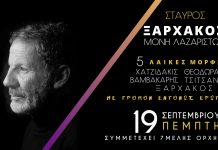Επιμέλεια: Εύα Πετροπούλου Λιανού
In my opinion, one of the central problems of Plato as regards the structure of the individual’s soul is to explain the possibility of the existence of Good in the individual dimension. Plato contends in some passages of the Republic that individuals have an evil factor within themselves. Therefore, the existence of Evil in the individuals is relatively easy to explain. On the contrary, the very possibility of the existence of Good in the individual’s dimension needs a complex foundation. The dimension of Good in the individual’s soul can be reached only through philosophical education; only education to philosophy can give due instruments to limit or to eliminate the presence of the individual’s evil factor.
In order to describe Plato’s positions, I would like to quote a passage in which Plato points out the existence of a component of the individual’s soul which is capable of every kind of crime; the passage is Republic IX, 571c3-d5. In the immediately preceding passage of the Republic, Plato has been speaking of a particular kind of desires which is present in the individual’s soul; in the present passage, he is going to describe these desires:
“- Those[1] – I said – that wake up in sleep when the rest of the soul – all that belongs to the calculating, tame, and ruling part of it – slumbers, while the beastly and wild part, gorged with food or drink, is skittish and, pushing sleep away, seeks to go and satisfy its dispositions. You know that in such a state it dares to do everything as though it were released from, and rid of, all shame and prudence. And it doesn’t shrink from attempting intercourse, as it supposes, with a mother or with anyone else at all – human beings, gods, and beasts; or attempting any foul murder at all, and there is no food from which it abstains. And, in a word, it omits no act of folly or shamelessness.
– “What you say,” he said, “is very true.”
Individuals constitutively have an evil factor in themselves. This evil factor is a kind of a subset of the sphere of desires belonging to the appetitive part of the human soul (of every human soul; nobody is excluded). The evil factor is capable of every kind of crime. Evil has, therefore, precise roots in the individual’s psychic constitution. Evil is an active, structural, constitutive factor of the individual; this factor is responsible for determined tendencies which individuals have and show in their lives: it follows, as a direct consequence of this psychic constitution, that individuals do evil.
Of course, individuals are not only evil, but they are evil too. Individuals have a kind of “anti-reason”[2] in themselves: whereas the individual’s rational part tends to Good[3], the anti-reason in the individual does the opposite. It is capable of every kind of Evil, and it aims at every kind of Evil: it is evil and it will produce Evil. Thus, the fact that Evil is active in the life of individuals, in human society and in human history is neither a coincidence nor an accident. The cause of Evil in the human dimension cannot be searched for and cannot be found in another entity than the human soul: the individual is responsible for the evil deeds which he commits. Nobody may blame external factors for his own actions: everybody ought to accept responsibility for his own deeds.
The human condition is particularly disadvantaged: the evil component does not seem to need, in Plato’s view, any particular education or any particular training in order to be and to become active and effective: the evil component is immediately active and effective. On the contrary, the rational part needs a long education in order to reach the condition of Good. The rational part is not immediately mature for Good, so to speak, since it needs education in philosophy. Individuals cannot expect that the Good in the soul will rise by itself, i.e., individuals cannot imagine that the Good in the soul will autonomously develop without the corresponding education. The Good in the soul does not rise, cannot rise, and will not rise without the individual’s immersion into the philosophical education. To do Evil is (relatively) easy; to be well-foundedly good and to do Good on a solid and lasting basis need, on the contrary, a long apprenticeship, since it needs the complete process of education of the soul. The enterprise of establishing of Good in the individual soul requires the complete philosophical meditation and philosophical education exposed in Books VI and VII of the Republic.
Since Evil is immediately present in everyone’s soul, the questions regarding the presence of Good and Evil in the human dimension, i.e., in human societies and in human history, should perhaps, at least in my opinion, not so much be:
- “Why does Evil exist? How is Evil possible? Whence does Evil come?”.
The question should rather be:
- “Why does Good exist? How is Good Possible? Whence does Good come?”[4]
In spite of the difficult condition of the human soul, Plato does not want to surrender to Evil. The remedy against Evil is, for Plato, philosophy: the therapy against Evil consists in the process of acquiring the kind of knowledge represented by philosophical education; only philosophical education can defeat the individual’s evil component. Plato’s project in Republic VI and VII consists, among other things, in leading the individuals progressively away from the dimension of Becoming, i.e., from the common way of living, towards the dimension of Being (towards the dimension of ideas). The dimension of Being represents an alternative dimension to the dimension of Becoming (this does not imply that the dimension of Being is completely extraneous to the dimension of Becoming, but the dimension of Being is nonetheless different from it). Thus, Plato’s projects consist in a profound transformation of the individual’s common way of living and thinking. Knowledge of the dimension of Being brings about the recognition that the dimension of Becoming is an inferior dimension. The dimension of Being is a dimension which is not immediately given to the individuals: it is a dimension which the individual ought and needs to discover and to reach.
The kind of knowledge which Plato seeks is transformative knowledge. The different steps of the process of knowledge and the whole process of acquiring knowledge constitute a complete transformation of the average way of interpreting reality and, at the same time, a complete transformation of the way of living. The individual’s life is renewed by philosophical education. Knowledge brings about a process of emendation of the soul; the process of knowledge is a process of emendation of the soul through the contact with the dimension of Being. Hence, knowledge represents a radical transformation of the individual. The solution to the problem represented by the constitutive presence of Evil in the individuals consists in the individual’s assimilation to the dimension of Being (i.e., to the dimension of Truth); this assimilation is produced by the process of knowledge acquisition. If the individual remains at the level of the simple opinion and does not reach the dimension of Being, the individual does not possess instruments which are appropriate to fight against evil impulses: he cannot withstand the impetus of Evil. The individual needs, therefore, truth and knowledge of the truth.
Exclusively the long, arduous, and strenuous philosophical training can supply the reason with the necessary instrument in order to combat and then to dominate the evil component present in every individual. The human reason needs activating; reason needs, furthermore, apprenticeship. Without the corresponding learning process, there is no hope against the force of Evil. With a kind of formula, it could be said, in my view:
- either philosophy or no ethics,
or, in other words,
- either philosophy or Evil.
Evil cannot be completely eliminated (at least not as regards the earthly dimension of the individuals), since every individual has an evil factor within himself. Evil comes into being together with the very birth of the individual. Individuals are responsible for the life which they choose. Individuals can defeat the Evil present in themselves. The presupposition of Plato is that individuals ought to want to defeat the Evil which is in themselves, i.e., that the individuals ought to take the decision for the acquisition of philosophical education. Without this decision, there is no way to begin the process of liberation from the evil component. Individuals ought to become aware of the difficulty of their moral situation. Plato does not conceal the difficulty of the human condition; he is nonetheless confident that at least some individuals can reach the condition of the right order of the soul.
Every individual, every political constitution, and every society will be, therefore, always exposed to the danger of moral degeneration. Evil will always appear in human history, or, at least, there will always be the danger of Evil appearing in human history (this independently of the specific historical period), because Evil is rooted in the very structure of the individual.
[1] I.e.: “Those desires”.
[2] I use this word in the same sense as anti-matter is used in relation to matter: anti-matter has an opposite sign to matter as well as anti-reason has an opposite sign to reason. The rational part of the human soul is, in Plato’s opinion, oriented to Good, in case it is and has been correctly developed, as it shines through in the Republic, whereas anti-reason is oriented to Evil.
[3] If the reason is brought to the right development, the reason will know and follow Good. This aspect can be found in the exposition of Republic IX. Reason needs development; the age of reason, for the human soul, does not rise by itself.
[4] I owe this question (and the sense connected to this question) to Imre Kertész. Kertész expresses the conception of the difficulty regarding the very possibility of the explanation of the existence of Good – in comparison with and in opposition to the existence of Evil not needing particular explanations or not needing explanations at all – in his book Kaddish for an Unborn Child (Vintage: New York, 2004; the Hungarian original title is: Kaddis a meg nem született gyermekért).


































